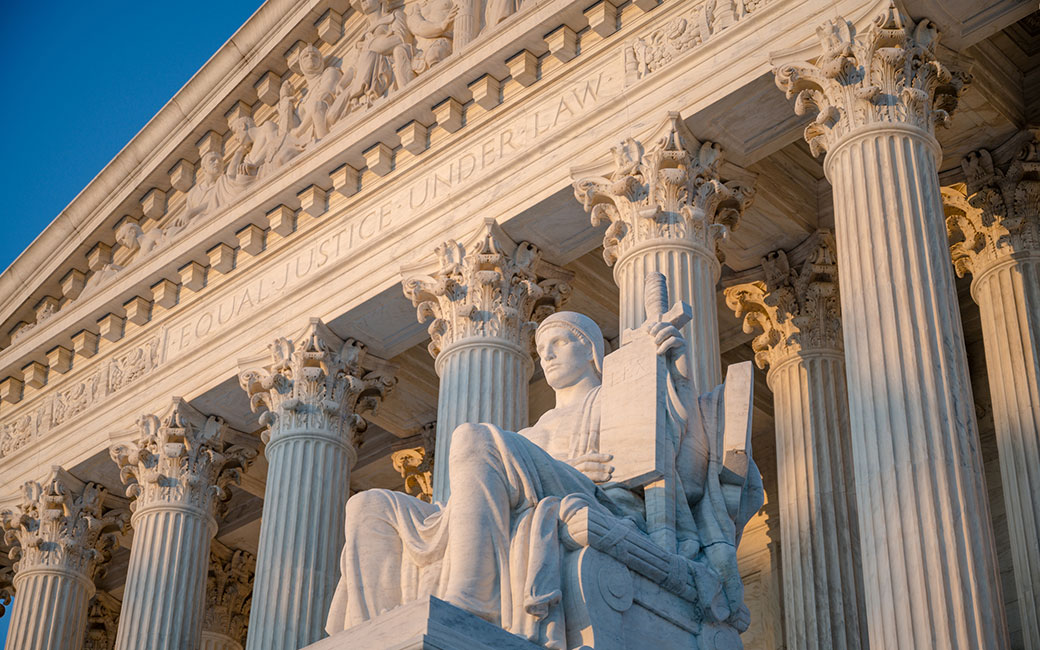Understanding the recent Supreme Court decisions on LGBTQ+ rights, DACA
TU lecturer Jonathan Hensley breaks down the newest U.S. Supreme Court rulings, previews what’s ahead
By Rebecca Kirkman on June 18, 2020

The U.S. Supreme Court decided two major cases this week related to LGBTQ+ rights and immigration.
In a 5-4 decision on Thursday, it ruled that the Trump administration could not immediately shut down Deferred Action for Childhood Arrivals (DACA), a program that shields about 700,000 young immigrants from deportation and allows them to work.
President Donald Trump in 2017 announced plans to end DACA, subjecting recipients to possible deportation and revoking their ability to work when their status expires. The University of California and other plaintiffs sued to keep the program in place, and the case was heard by the Supreme Court in November 2019.

Read more: President Schatzel’s update on the Supreme Court DACA ruling
On Monday, the Supreme Court ruled in a 6-3 decision that the Civil Rights Act of 1964 protects gay and transgender workers from workplace discrimination.
Several additional cases, on issues including abortion access and presidential power, have yet to be decided.
Towson University lecturer Jonathan Hensley, who has expertise in constitutional law, the American judicial system and the Supreme Court, breaks down the impact of these highly anticipated decisions.
The current Supreme Court decisions come amid a public health crisis. How has that impacted the hearings?
Because of the coronavirus, they have been doing their hearings remotely for the first time. One thing that’s been different is they have allowed media to listen live, which is a big deal for the Supreme Court considering that in the past they have had a policy of not making oral arguments open to the media or the public except for the number of people who can sit in the courtroom, and then audio recordings and transcripts are released later.
It seems like it will be something that will be hard to go back from, although I don’t think any of the justices have been eager to have live audio or live video in the past.
What does the decision on DACA mean, and what makes it politically relevant right now?
There are two important parts of DACA. One, the government will hold off on deportation, and two, the DACA recipient becomes eligible for benefits like employment authorization. When providing reasoning for repealing the program, the DHS secretary mostly considered removing the benefit, but did not take into consideration the effect of deporting people who had relied on DACA. DACA recipients have gotten jobs, gone to college and bought homes based on the belief that they were at least temporarily not going to be subject to deportation.
The DACA case finds that the Trump administration had not followed the required administrative procedures for repealing DACA. The majority opinion by [Chief Justice John] Roberts specifically notes that the Department of Homeland Security (DHS) can repeal DACA; the problem is that they did not go about it in the right way.
The bottom line is DACA could still be rescinded, but DHS would have to issue a new justification and it would have to show that they have adequately considered all the concerns involved.
This case is important politically because if DHS tries to rescind DACA again, that process is going to take a while, and the election could happen before they are able to do it.
Because of the court’s conservative majority, the 6-3 ruling for gay and transgender rights came as a surprise to some. What’s notable about this decision?
When they did the oral arguments on this case, some people were already speculating [conservative Justice Neil Gorsuch] might vote this way because of some of the questions he asked [about protections from discrimination because of sex].
It did surprise people, still, that Gorsuch and Roberts were in the majority. But his opinion is pretty clear in laying out his thinking. He said that when someone is fired for being homosexual or transgender, it means they are being fired for traits that would not have been considered a problem for a member of a different sex.
Isn’t this the first major supreme court case on transgender rights?
Yes, this case is certainly important in that respect. While there have been major gay rights victories, like the 2015 decision regarding gay marriage, up until now under federal law people were not protected from being fired or not being hired due to sexual orientation or gender identity. So this is a major development.
How might we see the impacts of these two decisions?
Employers will be more careful of protecting LGBT employees and potential employees. Certainly, we’ll now see more lawsuits alleging discrimination on the basis of sexual orientation or gender identity, because now it’s clear someone can sue on that kind of discrimination. Those kinds of lawsuits are generally hard for plaintiffs to win, but just the fact that employers will have to worry about them will make a difference.
With DACA, regardless of what happened in this case, immigration will be an issue in the upcoming presidential election. I think the question now is whether or not the Trump administration will try another attempt at repealing it before the election.
What other major cases still await decisions?
The decision for June Medical Services v. Russo has not come out yet, but that’s certainly an important one. It’s a challenge to Louisiana’s law that requires physicians who conduct abortions to have admitting privileges to a local hospital. The facts in that are really similar to a case that was decided a couple of years ago, Whole Woman's Health v. Hellerstedt. The issue here is that Louisiana may be doing something really close to what the court in Hellerstedt said they could not do.
Also, there are two cases that we’re still waiting on about President Trump’s financial records. One of them involves a subpoena from a grand jury for some of his financial records and tax returns. The other case involves a congressional committee subpoena for records from Trump’s accountant and some of his businesses. To have two really important cases in the Supreme Court involving the authority of two other branches [of government] to obtain the president’s financial records is certainly unusual. It’s one more thing to add unpredictability to this election year.